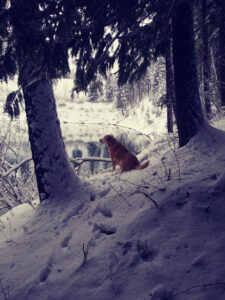Following the message, a long, plaintive beeeeeeeeeeeep told Della that Mix hadn’t checked messages for some time. It was as if the machine was as lonely as she, also lamenting his neglect. She imagined it listening for his fumbling fingers at the door, praying he would get the key into the lock before it died of longing.
When the phone quit keening, she hung up. For a long time after, with the phone cradled in her two hands like an electronic mandala, she sat cross-legged and silent in the middle of the living room floor. This was where she had wished to be when — if — he answered the phone: in the center of her small world. Her position was preparatory; her goal was to stay centered, on task; and to grind down the ambiguity and angst surrounding his absence and come to peace with his unspoken abandonment. She wished to speak to his ephemerality and to know that he had heard her.
A small thing, a wish to be heard.
The Rolling Stones played in her head. “You don’t always get what you wa-ant.”
Mix was his last name. “Like Tom,” he liked to say. His first was unglamorous and forgettable. If she thought long enough, she could dredge it up, but Mix is what he preferred, and it fit. Take beautiful black hair, steel blue eyes, square jaw, stunning humor, a gladiator’s body and the stupid crescent-shaped scar on his left cheekbone. Mix with her girl’s heart and woman’s loins. The compound result was love — or lust. Who could tell and what did it matter in the beginning? No difference was discernible in the roiling heat waves risen out of their corporate attraction.
After a while — an hour — she got up and put the phone in its cradle.
It was dark then, and she was tempted to not, but Antigone needed a walk. So did she. She found Tig’s leash and pulled a coat on. The dog lifted a suspicious eyebrow and stretched indifferently. Walks were utilitarian these days, and this mutt was nobody’s fool. Eight minutes on a leash and a short stop in the park across the street seemed hardly worth the trouble, necessary as it was.
“My dog is jaded,” Della thought. “How can a dog learn to be so cynical as this?”
Reflection is the word that came immediately to mind, as answers came to Della, even though she wished they wouldn’t any more. She had once treasured the instant answer to hard questions; but in these days of jaded dogs and missing men, she was not so happy to be blessed with it. She asked fewer questions.
Antigone — Tig — was her cousin Frank’s dog until one afternoon he got so high on cocaine that he floated right off the planet and never found his way back.
Antigone was just Dog then. “Like John Wayne’s dog in Big Jake,” Frank liked to say.
“Dog,” he’d growl — his John Wayne imitation — and Dog would bound to him, ready for anything. Dog loved Frank. Frank was her man, and she was distraught when Frank went missing, leaving his body behind.
So was Della.
Cousin is a distant-sounding word. More like friend-to-the-core. Brother. Blood brother. Her idea. His knife. Their blood. They were 19.
“You better not have AIDS,” she said as they stuck their index fingers together.
“Hepatitis B.” Frank said, perfectly deadpan. Frank was the perfect name for him, for he was. And funny as a rubber crutch — hilarious, in fact. They both rolled on the floor laughing, but that might have been the marijuana.
Ten short years later, Dog announced Frank’s departure from planet Earth by sitting at his cooling side and howling until neighbors called the police. Not that they were good neighbors. They just wanted Dog to shut up.
The police called Frank’s dad — it was a small town — and he took the back door off the hinges. Dog put up such a fuss at his intrusion that she was summarily and forcibly banished to the back yard, where she began to absolutely wail. When Della burst in — news travels by jungle drum in small towns — her uncle said, “If you don’t shut that goddamn dog up, I’m gonna shoot it.”
This gave Della something to do that needed to be done right now, and something she could save. She did not tarry, for she knew Uncle Ed could and would and had the pistol under the seat in his truck. Della went to the yard, got Dog to shut up by begging and crying and soothing her, put her leash on and took her through the house to her car, on which trip she looked in on Frank and Uncle Ed, who was pulling a syringe away from Frank’s arm. He caught her staring.
“Did you know about this?”
“Yes.”
“Who have you told?”
“Nobody.”
“Your cousin died of a heart attack, Della. Don’t forget that.”
Della almost ran, but she knew if she ran, he would come after her, and though he’d never harm her, it would be hours before she could sit down and kill herself, too.
She never did. Antigone — she became Antigone that very night — would not let her. She stayed awake at Della’s side all night, guarding against the hole in the sky that had snatched up the boss. Primary mission now was to protect the new boss.
Antigone got shortened to Tig, but Della knew what her name meant. Uncle Ed never said anything about that afternoon. Never.
Eight months later, she met Mix. They sat all night long in the 24-Hour Truck Stop Cafe talking about very important things. She confessed that she knew Frank was shooting cocaine, but she never told anyone and she would do anything to change that.
Mix said earnestly, “You can never go back, but you can surely go ahead.” That shook Della, because that was exactly what the Angel had told her when it came to visit three nights after Frank died. Someone knocked, and even as Della wondered why they didn’t ring the bell, she opened the door and found a woman standing on her porch in a tan raincoat and dark blue pumps with a plastic rain scarf over her hair.
“I’m Maggie Graham,” the Angel said. “I understand you’ve lost your cousin, Della.”
Della just stared at her.
“May I come in?”
Della stepped aside, and the Angel came in.
She said she was a pastor from Shoreline, which was 50 miles away, so Della didn’t give that much credence. She had to be an Angel.
Della fixed tea; Tig lay sleeping at the Angel’s feet, serene as can be; and they had a long, long talk. When the Angel was standing on the porch ready to leave, she said to Della that same thing Mix told her. Word for word.
Della wondered if Mix was an Angel, too. But, evidence was that this was probably not the case, though she admitted he did have a heavenly touch.
She didn’t tell Mix about the Angel. But she did move forward — or sideways or some direction. She moved. Now she wondered, Uh, Della. Was this the right thing to do?
And she didn’t know. But it was done, so she occasionally sat in the middle of the living room floor with the phone in her lap.
Now, she snapped Tig’s leash on, and then did something she hadn’t done for weeks. She picked up The Ball and put it in her coat pocket. If dogs have mandalas, Tig’s would be The Ball. She cocked the other eyebrow, pulled toward the door. She had seen The Ball.
Della undid the lock and opened the door. Tig stepped out and leaned at the very end of the leash as Della crossed the threshold, closed the door, turned the key in the lock, put the key in her pocket.
Inside, the phone began to ring. Della jumped involuntarily, as if she had touched a live wire. She looked at Tig, who stared back at her as if she was holding a pork chop.
“Let’ go!” she whined.
The message machine inside picked up and she could hear herself saying, “Hi, you’ve reached Della’s domicile. . . .” She reached into her pocket for the key, but there was The Ball, and Tig was sitting right where the Angel stood when she said, “You can never go back, but you can surely go ahead.”
The Rolling Stones sang, “But, if you try sometimes, you just might find, you get what you ne-e-e-eed.”
Della was off the porch before the recording said, “Wait for the beep.” Joy rose in her throat as she and Antigone streaked across the street and into the park on a dead run. She let the dog slobber The Ball up before she threw it into the dark. Antigone was gone only a few seconds.
Della threw The Ball until her arm hurt. Antigone brought it back every time.


